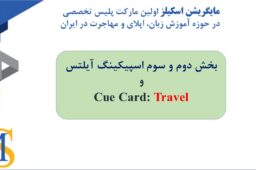No products in the cart.
مهارت رایتینگ IELTS و نکاتی در ارتباط با طرز نگارش مقاله برای کسب نمره 7/5 آیلتس

مهارت رایتینگ IELTS و نکاتی در ارتباط با طرز نگارش مقاله برای کسب نمره 7/5 آیلتس
مهارت رایتینگ IELTS به عنوان آخرین مهارتی که در روز آزمون سنجیده میشود، دارای دو بخش است. در بخش دوم مهارت رایتینگ IELTS در هر دو آزمون آکادمیک و جنرال، داوطلب باید یک مقاله یا Essay در مورد موضوعی که مطرح شده بنویسد و دیدگاه خود را بیان کند. این قسمت توانایی داوطلب را در مواردی مانند ارائه و توجیه نظرات و بحث در مورد موضوع میسنجد.
ما در مایگریشن اسکیلز یا مهارتهای مهاجرت در این مطلب قرار است طرز نگارش مقالات بیان مزایا و معایب یک موضوع در مهارت رایتینگ IELTS را بیان کرده و نکاتی را که برای گرفتن امتیاز بالا باید به آنها دقت شود مطرح میکنیم.
مهارت رایتینگ IELTS که فقط با نوشتن مستمر بهبود مییابد.
مقالات بیان مزایا و معایب یک موضوع
Advantages / Disadvantages
این دسته از مقالات هم مانند همه مقالات دیگر شامل یک مقدمه، بدنه مقاله و بند نتیجهگیری است که در ادامه توضیحاتی را در مورد نحوه نگارش هر بخش بیان میکنیم.
1) مقدمه (Introduction)
در مقدمه این نوع از مقالات ابتدا به بیان معرفی موضوع میپردازیم و سپس در ادامه در چند جمله با ذکر مثال با توضیحات به شرح مطلب میپردازیم.
۲) بدنه مقاله (Body)
بدنه این دسته از مقالات شامل دو پاراگراف یا بند است. در یک بند به ذکر مزایای موضوع میپردازیم و در بند دیگر معایب موضوع را مطرح میکنیم.
لازم به ذکر است استفاده از عبارات رسمی جهت اضافه کردن مطلب به هر بند امتیاز این بخش را بالا میبرد. برخی از این عبارات کاربردی در مطالب پیشین ما آورده شده است.
بند دوم را با توجه به آنکه جنبه دیگر موضوع را مطرح میکنند با عباراتی نظیر However یا But شروع میکنیم.
3) نتیجه گیری (Conclusion)
در این بند با توجه به مزایا و معایب مطرح شده یک نتیجه کلی و خلاصه گرفته میشود.

در ادامه نمونهای از سؤالات مهارت رایتینگ IELTS آورده شده است و داوطلب با مطالعه آن میتواند توانمندی خود برای نوشتن مقاله را بالا ببرد.
In some countries, young people are encouraged to work or travel for a year between finishing high school and starting university studies. Discuss the advantages and disadvantages for young people who decide to do this.
Give reasons for your answer and include any relevant examples from your own knowledge or experience.
Write at least 250 words.
Answer
Taking a “gap year” off between high school and university has become a popular option among many young people. This time off provides a break after many years of formal study. Some students use this time to travel around the world, others volunteer and still others begin working. The idea behind each of these activities is to do something hands-on and refreshing, which enables young people to learn more about themselves and their place in the world around them.
The benefits of taking a year off are plentiful. On a personal level, students who travel away from home develop their independence and self-confidence. On a cultural level, they learn about viewpoints, traditions and perspectives differences from their own. Professionally, students get a taste of diverse workplaces, which might inspire a possible career interest. Intellectually, they examine their own beliefs and ideas in relation to those of others in a new environment. All these advantages combine to make a strong case for taking the one-year break.
Nevertheless, there are also dangers involved in taking such a long break. Academically, the main drawback is that students can get sidetracked from their studies. A year is a long time and students could lose the good study habits and sense of discipline they had when they were in a formal academic structure. If they begin working, they could also be deluded into thinking that they’re making a lot of money. They could lose the benefit of college or university education and the chance to earn a higher income all their lives.
In conclusion, whether to take a year-long break or not is an individual decision. Each young person should consider his or her motivations carefully and decide on what’s most desirable. Time is a precious resource and people of all ages, including young people, should treat it with respect.
(305 words)

و سخن آخر از نظر مایگریشن اسکیلز …
مهارت رایتینگ IELTS از جنبه های مختلف، زبان انگلیسی را مورد سنجش قرار می دهد که شامل قدرت واژگان، گرامر، ایده پردازی و نحوه استفاده شما از زبان انگلیسی برای بیان نظر در مورد موضوع مطرح شده می باشد.
توجه کنید که در IELTS به صحت نظريه و دلایل شما نمره نمیدهند به روانی مطلب و استحکام بیان آن نمره میدهند. بنابراین میتوانید شواهد و دلایل را از خودتان اختراع کنید.
اگر تمایل به مطالعه منابع آزمون آیلتس دارید، میتوانید همین الان برای دسترسی به این منابع از سایت مایگریشن اسکیلز به آدرس www.migrationskills.ir دیدن کنید.
migrationskills3






